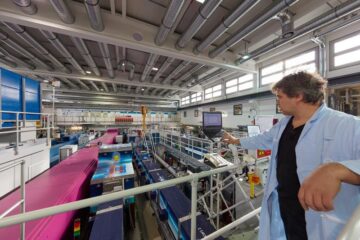HypoPlant – Production of hypo-allergenic glycoproteins in plants

Glycoproteins (GPs) are of prime interest in medical sci-ence. However, the production of GPs by standard methods is still complex and expensive. Plants have been suggested as potential cost-effective and safe GP-production systems; however, major differences in the final steps of biosynthetic pathways in mammals and plants lead to different glycosylation patterns, provoking an immune response when treating humans with GPs produced in plants.
Challenge State-of-the-art approaches utilize glycosylation mutants or overexpression of the desired protein product (intending to override the cellular glycosylation machinery), although such mutants either show impaired yield or loss of vitality in com-parison to wild type. Also, rarely glycan components termi-nate in mannose residues, which is essential for uptake via mannose receptors in patients with lysosomal storage dis-eases. This invention provides a new tool to generate GPs with hypo-allergenic properties in a cost-effective way: In con-trast to current methods, the new technique enables effec-tive production of heterologous GPs by vital plants without impair¬¬ments. The technology is based on genetic modifica-tion of the plant glycosylation pathway. The technology is applicable to Solanaceous and other plants of agronomical interest. Suppression of a specific enzyme results in a general reduction of cross-reactive car-bohydrate determinants (CCD) in all tissues, leading to GPs that are better tolerated and taken up by humans.
Weitere Informationen: PDF
PROvendis GmbH
Tel.: +49 (0)208/94105 10
Ansprechpartner
Dipl.-Ing. Alfred Schillert
Media Contact
Alle Nachrichten aus der Kategorie: Technologieangebote
Neueste Beiträge

Bakterien für klimaneutrale Chemikalien der Zukunft
Forschende an der ETH Zürich haben Bakterien im Labor so herangezüchtet, dass sie Methanol effizient verwerten können. Jetzt lässt sich der Stoffwechsel dieser Bakterien anzapfen, um wertvolle Produkte herzustellen, die…

Batterien: Heute die Materialien von morgen modellieren
Welche Faktoren bestimmen, wie schnell sich eine Batterie laden lässt? Dieser und weiteren Fragen gehen Forschende am Karlsruher Institut für Technologie (KIT) mit computergestützten Simulationen nach. Mikrostrukturmodelle tragen dazu bei,…

Porosität von Sedimentgestein mit Neutronen untersucht
Forschung am FRM II zu geologischen Lagerstätten. Dauerhafte unterirdische Lagerung von CO2 Poren so klein wie Bakterien Porenmessung mit Neutronen auf den Nanometer genau Ob Sedimentgesteine fossile Kohlenwasserstoffe speichern können…

















